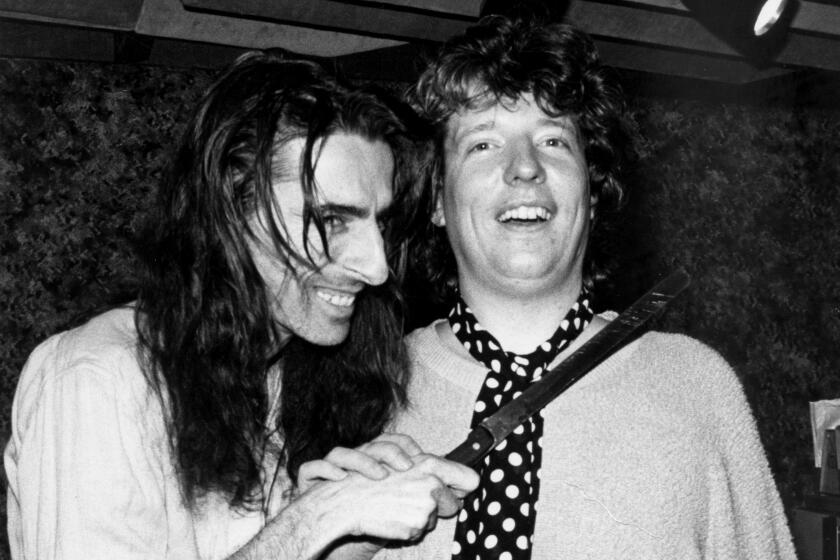Barry White’s Sound Has Made a Comeback, but Can He? : Music: The man who loves women has married his silky vocals to a hip-hop beat. He’ll : be at the Universal Amphitheatre Sunday.
- Share via
Barry White had several nicknames in the ‘70s, when his sultry songs were among the most popular in the era of disco.
He was known as Dr. Love and the Prince of Pillow Talk--and he smiles now at the mention of them.
In a playful mood during an interview at the Hollywood offices of A&M; Records, White said, “Women love to hear me say things like, ‘I love ya, baby.’ I was able to touch women at their very core. In the ‘70s, they loved me.”
But there’s another nickname from the ‘70s that he dismisses: King of Disco.
“That’s foolish,” White said, speaking with the intensity and authority of a preacher in the pulpit. “Disco had been around since 1969. I surfaced in 1972. I was just there at the right time with the kind of music that was happening.”
Another reason that White, 45, may not like the disco tag is that it has been a stigma in an ‘80s pop world that viewed the peppy dance music of the ‘70s as horribly passe.
But dance music is back in vogue, and some of pop’s most acclaimed new stars are pointing to White as a major influence. Among them, British soul singer Lisa Stansfield, whose “All Around the World” is one of the biggest-selling singles of the year.
An outgoing man who speaks effusively about music, White loves Stansfield’s record and takes pride in what he sees as elements of his style in the hit.
“She used my formula for phrasing, my chord progressions, my melody structure, my style of doubling of the harmony,” he said, with no sense of jealousy or resentment. “I appreciate that. She’s one of the students in the Barry White school of music.”
White also, justifiably, sees elements of his silky, sexy approach in the music of such other newcomers as England’s Soul II Soul as well as veterans like Luther Vandross and Michael Jackson.
Now White hopes that the public will respond to his own new album the way it has to the records by Stansfield and the others.
White had 10 Top 40 hits in the ‘70s, including “I’m Gonna Love You Just a Little More Baby” and “Never, Never Gonna Give You Up.” But when disco went under at the end of the decade, White’s popularity sank with it. It’s taken most of this decade for White, who’s appearing with his 32-piece orchestra at the Universal Amphitheatre on Sunday, to reestablish himself.
His singing on “The Secret Garden,” the hit single from Quincy Jones’ latest album, probably did more than anything else to reintroduce White to American fans. His own A&M; albums have also helped. The first, 1987’s “The Right Night,” didn’t catch on, but “The Man is Back” has been a steady seller in the soul market since last fall.
At times White spoke so fervently about pioneering the use of strings as a primary instrument in disco that he seemed to be bragging.
Sensing this, White paused. “I’m really a modest man,” he said. “I’m not bragging. Barry White doesn’t brag. But sometimes you have to speak up for yourself, to let people know what you’ve done. People forget. I know a lot of them forgot about me.”
White didn’t dwell on the ‘80s, mostly a down decade for him. The problem, he claimed, was that after more than 10 years of writing, producing and arranging music--for himself, the vocal group Love Unlimited and the Love Unlimited Orchestra--he simply needed a break.
“I was just tired,” he said. “So, I took a rest so I could come back rejuvenated.”
White grew up in Watts, a high-school dropout more interested in gang activities than music. But after spending seven months in jail in 1960 for a gang-related incident he declined to explain, White was through with that life. He turned to music, where he was no overnight success.
“I was on the streets for 11 1/2 years before I got a hit record,” recalled the singer, who worked as a session pianist and arranger in the ‘60s. “I was struggling and hustling and getting nowhere. I had four kids by the time I was 21. We survived on welfare for five years. Sometimes I thought those rough days would never end. But I kept pushing and pushing.”
In the early ‘70s, White discovered a marketable formula. “My music deals with the relationship between two people,” he said. “I’ve always written music that people can play during romantic moments. One thing I do is speak sensitively to women. Most men don’t do that. They don’t think it’s manly to express themselves in a tender manner to women.”
These days White has comfortably married his signature style with frantic hip-hop rhythms. The difference between now and then White noted, is mostly technology.
“They have machines for this sound and machines for that sound, but one thing remains the same,” he said. “The song is the most important thing. That hasn’t changed. As long as I can still write a song, there’ll be a place for me in music.”
More to Read
The biggest entertainment stories
Get our big stories about Hollywood, film, television, music, arts, culture and more right in your inbox as soon as they publish.
You may occasionally receive promotional content from the Los Angeles Times.










